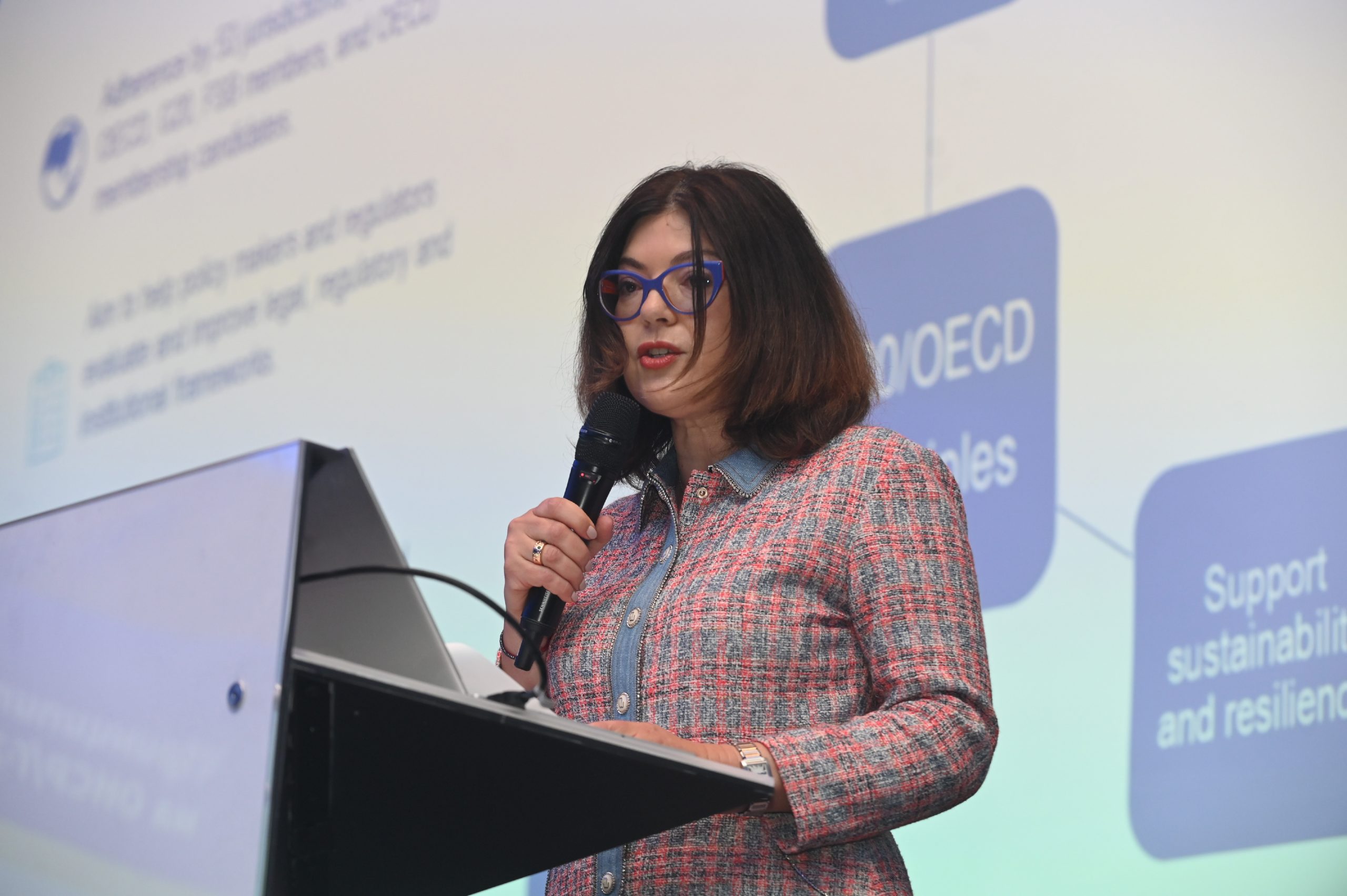On the 11 of June, the Financial Supervision Commission (FSC/Commission), in partnership with the National Corporate Governance Committee (NCGC), organized and held a conference dedicated to „OECD/G20 Principles of Corporate Governance – Good Practices for Sustainable Growth.“ The forum featured the exchange of experience and best practices relying on the corporate governance principles, ESG and governance, mechanisms for sustainable development of the insurance sector, and incentives for corporate engagement in capital pension schemes.
The event took place in Sofia and brought together the leadership of the Commission, supervised entities, amongst which public companies, investment intermediaries, insurance companies, and pension insurance companies, institutional partners, business representatives, the state, consultants, and media, all of them motivated by the purpose to discuss the role and importance of the corporate governance and sustainable development, as well as the challenges related to them.
The conference was opened by the Chairman of the FSC, Mr. Vasil Golemanski, who emphasized the importance of corporate governance as a key factor for investor confidence, financial market stability, and the promotion of long-term economic growth. He noted that over the past years, corporate governance has been amongst the leading priorities in the work process of the authority and the Bulgarian business, as well:
„In addition to fulfilling its role as a supervisory and regulatory body, the FSC also aims to actively support business pursuing the goal of creating sustainable and steadily developing markets.“
Mr. Golemanski pointed out that the Commission actively participates in the European Supervisory Authorities’ activity and represents the state in plenty of international organizations acting in the non-banking financial sector. He also stressed the role played by the regulatory authority in the process of the forthcoming accession to the Eurozone and drew the attention of the audience to the FSC contribution made in the process of the achievement of the national strategic goal, namely Bulgaria’s membership in the Organisation for Economic Co-operation and Development (OECD). In this regard, he emphasized the successful cooperation between the FSC and the OECD Corporate Governance Committee in developing and implementing the updated Principles of Corporate Governance, which were officially adopted in 2023:
„We made significant efforts, together with the Bulgarian Stock Exchange (BSE) and the National Corporate Governance Committee (NCGC) to integrate these principles into the new Code of Good Corporate Governance, adopted by the FSC on June 5 this year,“ noted Mr. Golemanski, adding that the FSC will persistently work for the voluntary observance of the Code by supervised entities.
„We are convinced that good corporate governance is the foundation for building trust between investors and issuers and for the stable growth of the capital market. We believe that a significant number of issuers will comply with these principles not only because the FSC recommends them, but because they realize their role in creating a sustainable and transparent market,“ he added.
Ms. Fianna Jurdant, Senior Policy Analyst at the OECD, also addressed the participants. She presented the updated OECD/G20 Principles of Corporate Governance, adapted to the dynamic economic and regulatory environment and aimed at achieving greater sustainability, accountability, and innovation:
„I would like to emphasize the key importance of the revised G20/OECD Principles of Corporate Governance, which represent a leading international standard in this field and are recognized by over 50 jurisdictions. They not only set standards for good corporate governance, but also provide guidance for building a legal, regulatory, and institutional framework, which fosters market confidence, economic efficiency, and financial stability. They are structured around six main pillars and reflect the evolution of global challenges and new trends – such as sustainability, digital risk management, the role of institutional investors, and the new expectations for boards of directors. The revised principles include specific recommendations related to transparency, accountability, investor protection, better shareholder engagement, and addressing systemic risks, including those stemming from climate change and technological transformation. Their strategic goal is to help companies improve access to capital, strengthen investor trust – including households investing their savings – and ensure the sustainable development of the corporate sector. This is why the OECD and the G20 adopted the new text of the Principles in September 2023 as a key instrument for the stability of financial systems globally.“
In the first panel, „OECD/G20 Principles of Corporate Governance,“ moderated by Ms. Natalia Petrova, Chair of the National Corporate Governance Committee, emphasis was placed on the practical application of international principles in the Bulgarian context. Ms. Petya Hantova, Director of the Investment Activity Supervision Directorate at the Financial Supervision Commission, shared with the audience:
„At the core of a company’s success is good corporate governance, which is of paramount importance and just as important as building a good business plan. Corporate governance illustrates the way in which a company is strengthening its position of a self-supervising one, which deserves the capital of its investors and the trust of its shareholders, who provide it loans.“
Ms. Hantova pointed out, that more and more investors are interested not only in the figures, but also in the essence lying behind them, namely how companies implement corporate governance principles in their activities. She focused on the main pillars of corporate governance, which ensure that companies are responsible for their actions, operate openly and transparently, treat all stakeholders and parties fairly, and act responsibly towards society and the environment. In conclusion, Ms. Hantova emphasized that the essence of corporate governance is to protect shareholders’ rights, support the sustainability and vitality of companies, and improve the interaction between employees and the management body, terminating her message with the words “a company without system for corporate governance is like a body without soul and conscience”.
In her presentation, Ms. Natalia Petrova stressed the importance of sustainable development and ESG factors, the role and independence of governing bodies. She emphasized the circumstance, that „corporate governance is made by people“ and highlighted in this regard the significance of the collaboration between business representatives, professional associations, and academia.
The discussion featured Mr. Angel Rabadzhiev (Board Member of the Bulgarian Association of Licensed Investment Intermediaries), Ms. Daniela Peeva (Chair of the Investor Relations Directors Association), Mr. Daniel Donchev (Board Member of the Bulgarian Association of Asset Management Companies), Mr. Nikolay Martinov (Independent Director of Shelly Group AD), Ms. Sofia Argirova (Investor Relations Director of Stara Planina Hold AD), and Mr. Stanislav Tanushev (Investor Relations Director of Sirma Holding AD). The focus was on best practices in managing public companies, increasing transparency and accountability, and the role of investor relations directors in building trust.
The panel „ESG and Corporate Governance: The Path to Sustainable Investments“ was focused on the integration of ESG (Environmental, Social, and Governance) factors into corporate governance as a tool for long-term value and investor appeal.
Ms. Denitsa Velichkova, Deputy Chair of the FSC and Head of the Investment Activity Supervision Division underlined that ESG and corporate governance are not topics of the future, but of the present being in the middle of the today’s regulations and continuously gaining in importance:
„Until recently, we spoke of corporate governance and ESG observing them as two separate concepts: the first related to internal structure and accountability, while the second making an impact on the environment and society. Now we see that they are two sides of the same coin. Sustainable development is not possible without good governance, and good governance – without a strategic understanding of sustainability. Today’s investor expects not only returns, but also security, transparency, and a long-term vision. That is why the role of the regulator is evolving – to encourage sustainable dialogue, quality non-financial reporting, and the implementation of international standards, in order to make data comparable and reliable. Only in this manner we could build a real foundation for sustainable investments that are not driven by a trend, but by well-conceived strategy. It is important to declare, that ESG is not an ‘add-on’ to the standard business model. It represents a new investment culture that requires a shift in mindset – from minimum requirements to strategic vision. This is precisely where the role of corporate governance lies – to ensure a structure in which sustainability is part of the organization’s DNA.“
Panel participants, moderated by Assoc. Prof. Dr. Manyu Moravenov (CEO of the Bulgarian Stock Exchange AD) included Mr. Daniel Blum (OECD), Ms. Hristina Pendicheva (Ministry of Finance), Mr. Alexander Peev (CSR General Manager, UBB), and Ms. Daniela Sokolova (Telelink Business Services). They discussed the challenges of implementing ESG standards, the need to adapt to European regulations, and the role of sustainable governance in investment decision-making. Mr. Blum noted Bulgaria’s progress and the actions taken since 2023 toward its OECD membership:
„The country is heading in a very good direction and must continue to develop its market while maintaining the attractiveness of reliable companies,“ he said. He added that while challenges remain, he is confident in Bulgaria’s success and sustainable development.
Assoc. Prof. Dr. Manyu Moravenov presented the first report by the Centre for Sustainable Finance and Energy (Green Centre), focused on how Bulgarian companies report their sustainability. The report showed that sustainable corporate behaviour is increasingly entering the practices of various sectors of the Bulgarian economy. Large banks show strong ESG policy integration, state enterprises demonstrate high social accountability, and public companies maintain established corporate governance practices.
Special participation in the conference came from Prof. Bistra Boeva – a long-standing expert in corporate governance and member of the National Corporate Governance Committee – who was awarded by Ms. Natalia Petrova, Chair of the NCGC.
The third panel of the event – „Sustainable Development of the Insurance Sector“ – was moderated by Mr. Hristo Nikolov, business journalist from Bloomberg TV Bulgaria. Panelists – Ms. Kristina Petkova (Director of the Insurance Supervision Directorate, FSC), Ms. Rositsa Vartonik (consultant at the Association of Bulgarian Insurers), and Mr. Veselin Angelov (managing director at CEO of Allianz Bulgaria and Board Member of ABI) – explored mechanisms to ensure sustainability in the insurance sector in light of corporate governance. Topics included accountability and transparency, the need for effective supervision, as well as increasing the consumer trust and educational insurance culture. Ms. Petkova stated that the FSC would continue to follow EIOPA rules and monitor ESG reporting by companies.
The final panel – „Corporate Engagement and Long-Term Investments in the Pension Sector“ also moderated by Mr. Nikolov was focused on the importance of flexible investment strategies aligned with the long-term interests of insured persons. Panelists – Ms. Milena Ivanova (Director of the Regulatory Regimes of the Social Supervision Directorate, FSC), Mr. Nikolay Slavchev (General Methodologist at Pension Assurance Company Allianz Bulgaria AD), and Mr. Miroslav Marinov (Managing Director at Pension Assurance Company Doverie AD) – discussed the opportunities for corporate engagement through sustainable and long-term investments including the role of pension funds in corporate governance and the implementation of the multi-fund model in supplementary pension insurance.
As result of the conference, the FSC reaffirmed its commitment to comply with the best international practices in the corporate governance for building transparent and stable financial markets and creating conditions for sustainable development of the non-banking financial sector in Bulgaria.







